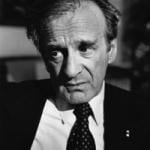My former Penn State colleague Tobias Brinkmann has just published a striking book called Sundays at Sinai: A Jewish Congregation in Chicago. I’m anxious to draw attention to it because so many congregational histories of any faith tradition are commonly pedestrian, and of such limited value outside that immediate circle. (A popular astronomical theory holds that billions of unsold copies of congregational histories may account for the dark matter that disturbs the rotation of our galaxy). Sundays at Sinai, in contrast, deals with a really important topic, and does so with enormous erudition. As Martin Marty says, this book “makes it possible for readers to be informed and entertained at once.”
The book tells the story of the Chicago Sinai congregation as European Jewish immigrants tried to come to terms with an overwhelmingly Christian America. Like all immigrants, they freely acknowledged that they could not live exactly as they had in their former homelands, but how much of their old customs and beliefs should they set aside in order to integrate? Put another way, how much of their former mode of life and worship could be consigned to the customs of the old world, as opposed to the core of Judaism? The Sinai congregation took the lead in the Reform tradition, which adapted quite radically to American ways, to the point – in 1874 – of adopting Sunday services. Under the brilliant leadership of progressive rabbi Emil Hirsch (1880-1923), Sinai and Reform achieved national celebrity. After his time, though, the congregation lost its visibility and in some ways its core mission.
At every stage, Brinkmann places Sinai in the context of Chicago’s broader religious history. He traces the many linkages with Protestant congregations, and especially the African-American religious world. The book’s implications certainly extend to Christians as well as Jews, and there is something here for anyone interested in such prime American themes as immigration history and urban history, particularly during the Progressive era.
Also on Jewish matters, I just received the latest number of the Jewish Review of Books, one of my favorite cultural-literary magazines. The latest Summer issue (subscription required) is fully up to standard in terms of writing, and the breadth of interesting matters covered. Michah Gottlieb, for instance, has a provocative piece called “Are We All Protestants Now?” about shifting definitions of exactly what a “religion” is, and whether or not Judaism qualifies.












